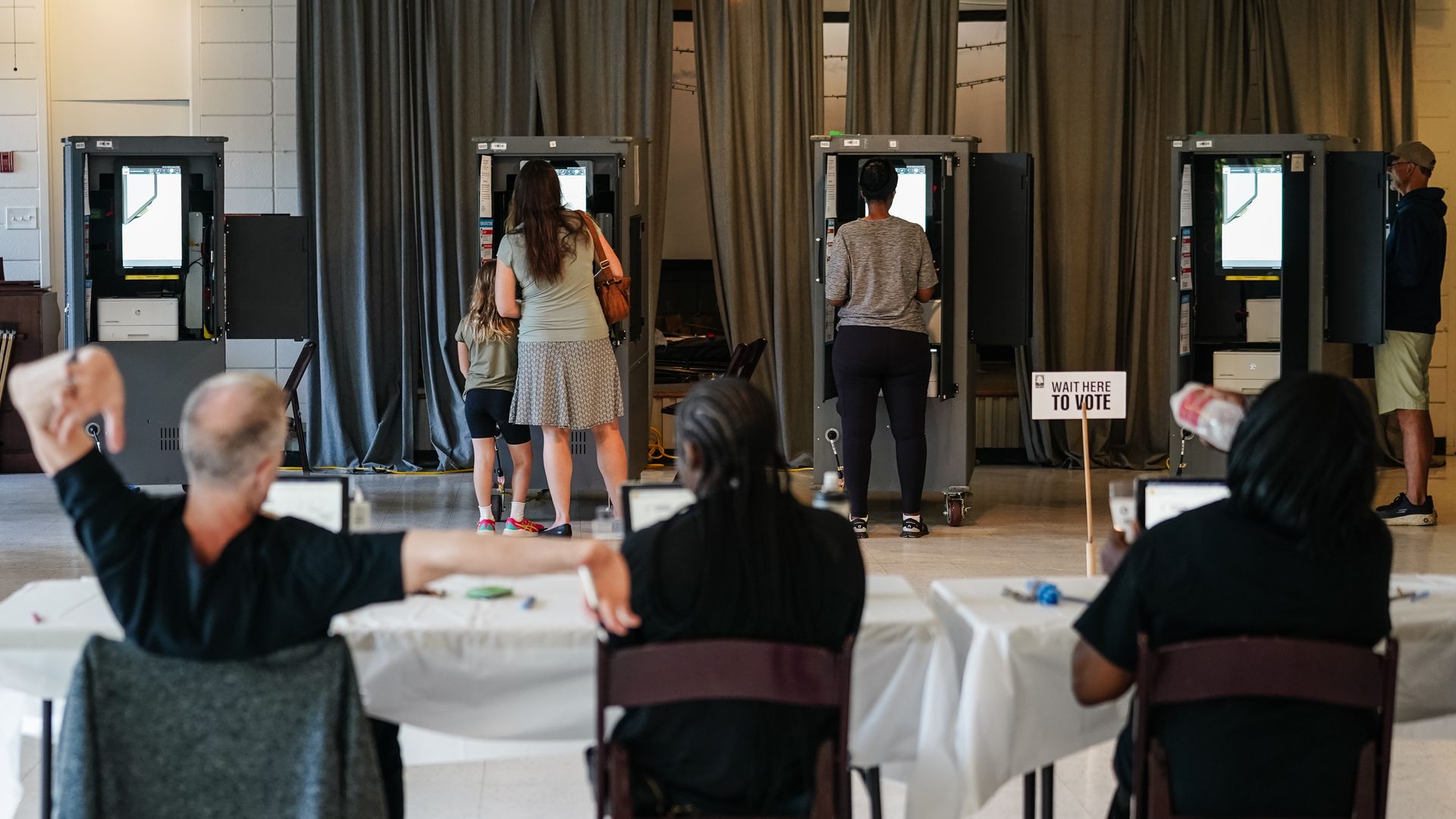Swing State: Will Georgia Return to the Republican Fold?

“Georgia is a battleground that was crucial to the coronation of the last two U.S. presidents.”
Georgia has long been a Republican stronghold, but with President Joe Biden's victory in 2020, the southern state has become a swing state, making it a hotly contested battleground in the November 5 election.
With 16 electoral votes, Republican candidate Donald Trump is competing with his Democratic rival Kamala Harris to win the state’s votes, especially since 8 of the last 12 Georgia winners have eventually reached the White House.
New polls found Trump leading Harris, 50% to 49%, among likely general election voters in Georgia. But among independents in Georgia, Harris is beating Trump 51% to 46%.
From the late 19th century until 1960, Georgia was a blue state that voted for the Democratic presidential candidate in every election.
But from 1964, it turned red, and its voters voted for Republican candidates in every election, until Biden won it in 2020 by a narrow margin.
Swing State
Both Democrats and Republicans have focused on Georgia in recent weeks, with both former President Donald Trump and current Vice President Kamala Harris seeing its 16 electoral votes as crucial in the race for the White House.
If Harris wins Georgia, she will have 242 electoral votes, putting her within two swing states, Pennsylvania and Michigan, of the 270 electoral votes needed to reach the critical threshold.
Trump, meanwhile, is holding on to the state, which also puts him within two swing states, Pennsylvania and North Carolina.
Before Joe Biden dropped out, Trump's campaign was so confident of victory in Georgia that it had spent less than $3 million on ad buys.
Since Harris' emergence, Trump's campaign spent more than $30 million into advertising in Georgia, outspending the Harris campaign through the month of August.
Both sides have committed to spending more than $37 million each in Georgia through Election Day, according to AdImpact, a firm that tracks political advertising.
In late July, Harris traveled to Atlanta, Georgia, to attend a rally featuring rappers Megan Thee Stallion and Quavo that drew more than 10,000 people.
“I’m very clear: The road to the White House goes through this state,” Harris said at the event. “You all helped us win in 2020, and we’re going to do it again in 2024.”
A few days later, at the same location, Trump and his running mate, J.D. Vance held a rally and spoke to a large crowd.
During the rally, Trump launched a barrage of personal attacks against Georgia Gov. Brian Kemp, a Republican, reigniting a bitter party battle in the crucial state.
Trump later issued a conciliatory statement in a post thanking Kemp for his help and support in Georgia.

Critical Voters
Georgia’s political landscape is heavily influenced by its African-American population, which makes up a third of the electorate, one of the highest percentages of any state.
The fact that the state has a large minority population means that African-American voters will be a critical group in Georgia this November.
However, more than half of the state’s population is white, with Latinos accounting for 10.5% and Asians at 4.8%.
In contrast, experts credit African voters with swinging the state to Biden in the 2020 election and electing two Democrats to the Senate, which also enabled them to seize a majority.
The African vote is also what Harris is counting on today in a very close election that polls show is almost tied between the two candidates, according to several polls.
While this is a significant advantage for Harris over Biden, who was trailing Trump by 5 points, the threat he faces is that 12% of black voters remain undecided.
Trump has broad support from Republicans, with 90% saying they would vote for the former president, while two-thirds of white voters and a majority of voters over 65 said they would support him.

Republican Split
Like most swing states, Georgia voters’ priorities include the economy, inflation and cost of living, followed by issues like protecting democracy, abortion and immigration.
Harris has recently focused on abortion, after reports emerged that a 28-year-old woman died because of state laws that prohibit abortions after six weeks of pregnancy.
Democrats have pointed the finger at Trump, pointing to his appointment of three conservative justices to the Supreme Court, which led to the overturning of Roe v. Wade, the federal law protecting abortion rights.
But the numbers are not in Harris’ favor on this issue, in terms of support from women, who make up 51% of the state’s voters.
65% of white women voters say they will vote for Trump, which also reinforces the importance of the African-American vote for the Democratic candidate.
Another issue Harris seeks to highlight is the Republican divide left by Trump’s attacks on state officials following his loss in the 2020 election.
A leaked audio recording of former President Trump demanding that Republican Secretary of State Brad Riefensperger find 11,780 votes to defeat Biden was released at the time.
The recording led to a lawsuit that Trump is facing in the state on charges of seeking to cheat in the election, in addition to public attacks by the former president against the secretary of state and its governor. This case has been raging in the courts for the past years.
It is noteworthy that Trump’s legal battles have recently complicated the political environment in Georgia.
At the same time, Trump’s reopening of the old enmity between him and Republican Governor Brian Kemp, due to these accusations, has raised concerns among Republicans.
From 2020 until last August, Kemp was subjected to a scathing attack from Trump, who described him as bad and disloyal, blaming him for his loss to current President Biden.

Legal Battle
Last week, Democrats announced they were suing the Trump-backed Georgia State Elections Board over new rules that give county boards the discretion to refuse to certify results.
The state election board voted 3-2 to approve the move after three Trump allies supported it.
Before the new rule was passed, Republican state Attorney General Chris Carr’s office warned that the new rules violated state law.
“This rule is unproductive and unlawful, and we are fighting it,” said Quentin Fulks, principal deputy campaign manager for Kamala Harris’s presidential campaign.
Democrats fear that if Trump loses Georgia in November, his campaign will likely pressure local officials to use this power.
Some Republicans, on the other hand, fear that the upcoming presidential election could be thrown into chaos if the results are not certified, potentially disrupting voting in the state and thus affecting the entire electoral process.

In turn, Washington-based activist Omar Taha predicted in a statement to Al-Estiklal that “Georgia will witness close results in this year’s elections again, as both campaigns are working strongly in the state, in addition to the new wave of enthusiasm for the Democrats after Biden’s withdrawal.”
He explained that “while the two parties are competing to win the votes of Georgia, two key counties stand out, Fulton county as a stronghold for the Democrats and Rabun county as a stronghold for the Republicans.”
“The new rule in Georgia could cause election chaos, cost money and produce counting errors, opening the door to doubts about the election results in November,” he said.
Mr. Taha concluded that “today, four years later, Trump can rely on the county boards, at least to create chaos if he loses the state again and its officials refuse to respond to his demands.”
Sources
- Trump and Harris battle for Black voters in Georgia
- In Atlanta, Harris confirms how central reproductive rights are to her campaign
- Trump ahead of Harris 1 point in Georgia and Arizona, tied in North Carolina: poll
- The new Georgia rule that could cause election chaos
- Democrats sue Georgia election board over new ballot hand-count rule
- Trump again tears into Georgia’s Republican governor on the same day he campaigns in the state
- Harris Had Stronger Debate, Polls Find, but the Race Remains Deadlocked










